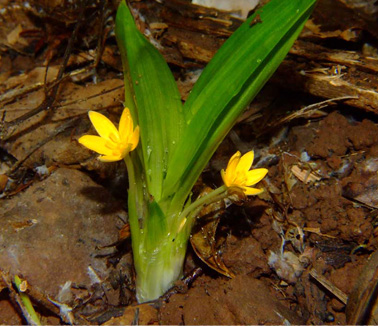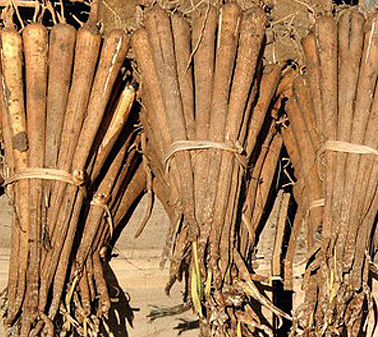|
Botanical Name:
Curculigo orchioides
Krishna musali consists of dried rhizome of Curculigo
orchioides Gaertn, Family Amaryllidaceae
Common Name(s) in English & Indian Languages
Sanskrit: Bhumitila
Assamese: Talmuli, Tailmuli
Bengali: Talmalu, Tallur
English: Golden Eye Grass
Guajarati: Kalirnusali
Hindi: Syahmusali, Kalimusli
Kannada: Neltal, Neltathigodde, Nelatale, Nelatelegadde
Malayalam: Nilappenea
Marathi: Kali musali, Bhuimaddi
Oriya: Talamuli
Punjabi: Syah musali, Musali safed,
Tamil: Nilappanai
Telugu: Nel tadigadda
Urdu: Musali Siyah, Kali Musali
Botanical description:
It is a small herb, upto 30 cm high with tuberous root
stock, occurring wild in sub-tropical Himalayas. Curculigo
orchioides is cylindrical, slightly curved, 3 ~ 10 cm long,
and 0.4 ~ 0.8 mm in diameter. The outer surface is blackish
brown ~ reddish brown, coarse, and left with scars of root
hairs and longitudinal transverse wrinkles. The snapped
surface is uneven, pale brown ~ reddish brown, and dark in
the stele. The texture is hard and easy to snap off. It
smells slightly characteristic, and tastes bitter and
slightly hot.
Parts used:
Rhizome
Major chemical constituent:
Tannin, Resin, Sapogenin and Alkaloid
Therapeutic uses:
• Haemorrhoids (Arsa)
• Disease due to Vata dosa (Vataroga)
• Emaciation (Karsya)
• Debility due to chest injury (Kstaksina) |
|


|
|
|



